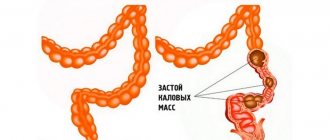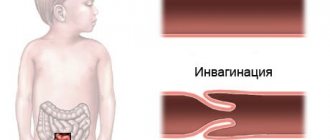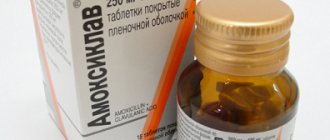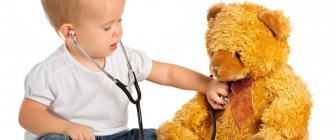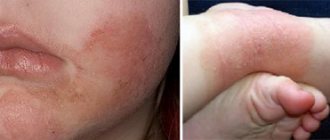Symptoms of constipation
Teenagers are embarrassed to talk about intimate problems, so parents may not immediately find out about constipation in children aged 13. The main method of prevention will be a preliminary agreement with the child that he will talk about problems with bowel movements. Talk to him about the normal process of emptying: he should have stool within two days, or better yet, every day in the morning. It should be of normal consistency, soft, but not liquid. The stool is dry, large in size, interspersed with blood, indicating problems. If your teenager tells you about these symptoms, you can start fighting constipation in time. Symptoms may also include:
- abdominal pain;
- pain in the anus during bowel movements;
- long act of defecation (half an hour or more);
- feeling of insufficient bowel movement.
The most serious symptoms of gastrointestinal disease are severe pain and fever. Then emergency medical care is needed.
Up to contents
Constipation in a child: what does school have to do with it?
Many are sure that diagnosing constipation is simple: if a child rarely goes to the toilet, this is constipation. However, the question immediately arises: what does “rare” mean? Some children older than one year go to the toilet 1-2 times a day, for others it is normal to have a bowel movement every two days. The frequency of bowel movements is certainly important in diagnosing constipation, but it is important to pay attention to other symptoms.
So, a child is most likely constipated if:
- he walks less than three times a week;
- defecation causes pain or discomfort;
- the child makes significant efforts to go to the toilet and pushes in vain;
- the stool is dense, lumpy, and large in diameter (the Bristol scale is usually used to determine the shape and consistency of stool; the first two types are typical for constipation);
- the child consciously holds the stool, suppressing the urge to defecate: for example, crosses and tucks his legs, and also if going to the toilet/potty turns into a complex ritual;
- fecal incontinence is periodically noted, panties are soiled with liquid fecal contents - the so-called fecal smearing, or encopresis.
The child does not have to have all of the symptoms listed. To diagnose constipation in children over 4 years old, it is enough to have at least two in the last month. At the same time, the frequency of bowel movements does not play a decisive role: if a child goes to the toilet every day, but with difficulty and through pain, this is a reason to go to the doctor and start treatment.
The most common causes of constipation include:
- Suppression of the urge to defecate. Simply put, the child wants to go to the toilet, but does not go. Most often, children are uncomfortable using a public toilet in kindergarten/school and they endure it until they get home. Sometimes children are too engrossed in the game and don't want to be distracted. It is much worse if the child deliberately withholds feces because he is afraid of pain. This starts a vicious circle, because the longer he endures, the more painful it is for him to go to the toilet: bulky feces injure the mucous membrane, leading to the appearance of cracks.
- Changes in diet: little water and fiber, a lot of easily digestible carbohydrates. Quick snacks at school, the eternal rush, lack of constant access to water - all this leads to constipation during the school year. In kindergarten, the nutritional regime is usually better than that of schoolchildren, but with water things are sometimes worse: children rarely ask to drink on their own and therefore usually receive water on a schedule, and not at will. (But even here there are exceptions: for example, in the most ordinary kindergarten where my child goes, the nannies bring out trays with mugs during walks so that the children can quench their thirst right on the street, for which I am very grateful to them).
- Change in the usual way of life: the holidays end, the daily routine changes, schoolchildren spend most of the day sitting at their desks without moving. In addition, the beginning of the school year is always stressful, which in itself is a powerful trigger for constipation.
Thus, in most cases, constipation is associated with psychological factors, an unbalanced diet, lack of fluid in the diet and a sedentary lifestyle. Now it becomes clear why problems with bowel movements in children so often accompany the beginning of the school year. Of course, there are other reasons for constipation: for example, taking certain medications or trying to potty train too early and unsuccessfully. In rare cases, constipation does not occur on its own, but becomes a manifestation of another disease. To exclude this possibility, doctors pay attention to the so-called “red flags”:
- onset of constipation in the first month of life;
- blood in the stool (blood is not always a sign of a serious illness. With constipation, a few drops of blood on the surface of the stool may appear due to damage to the mucous membrane during bowel movements);
- poor weight gain and growth retardation;
- vomiting with bile;
- fever;
- anxiety, refusal to eat;
- excessive bloating;
- anal malformations;
- weakness in the legs, changes in gait;
- the presence of a tuft of hair above the lower spine (may be a manifestation of Spina bifida);
- presence of Hirschsprung disease in family members, etc.
How to deal with constipation?
Every child sometimes has difficulty defecating. If after one or two days everything returns to normal, this is temporary constipation. In this case, diet correction will help:
- Make sure your child drinks a lot, organize constant access to water at school and kindergarten (cooler, take bottles with you);
- limit the consumption of sweet carbonated drinks and juices (except for apple, pear and plum, they have a slight laxative effect);
- Make sure your child has enough fiber in his diet. They are found in fruits, vegetables, bran, cereals, dried fruits and beans.
If problems with stool are chronic, the child experiences pain during bowel movements and is afraid to walk in a big way - diet alone cannot be done; treatment must be comprehensive and long-term.
Poor nutrition and/or deliberate retention of stool (due to the habit of waiting until home or fear of pain) leads to the accumulation of a large volume of dense feces in the final sections of the intestine. The rectum stretches and loses sensitivity - that is, over time, the child ceases to feel the urge to defecate and holds stool unconsciously. New portions of liquid feces flow around the solid feces accumulated in the rectum and exit through the stretched and loosely closed anus. This leads to clotting. The child cannot control this process, and reproaches for soiled panties only aggravate his suffering and stress.
What to do?
The first step is to eliminate the fecal blockage using a cleansing enema. But it is worth remembering that a one-time bowel movement will not affect the main cause of chronic constipation - an overstretched rectum. That is why in the future it is necessary to take long-term - for several months - use of laxatives that make the stool soft. During this time, intestinal tone and reflexes are normalized, the child will no longer experience pain and be afraid of bowel movements. For this purpose, products based on macrogol (polyethylene glycol) or lactulose are usually used. These laxatives are not addictive; over time, they are gradually discontinued, and the child continues to go to the toilet on his own. Treatment is best carried out under the supervision of a pediatric gastroenterologist.
When treating constipation:
- Pay attention to what your child eats and how much he drinks (see above).
- Form correct toilet habits: put your child on the toilet or potty at approximately the same time every day - preferably after a meal, and for children who attend kindergarten/school and have difficulty defecating in a public toilet - in the morning, before leaving home. Pay attention to the child's posture during defecation: the legs rest on the floor (toilet stand), and do not dangle in the air.
- Find out what exactly prevents him from going to the toilet in the garden and school. Sometimes the reason lies in the lack of toilet paper, doors on stalls, and so on - perhaps you will be able to resolve these problems with the administration of the educational institution.
- Increase your child’s physical activity: enroll him in a sports section, take a family walk before bed.
- Encourage your child's successes and don't make a tragedy happen because of failures.
- Seek help from a psychologist if your child is experiencing severe stress and this is aggravating the problem of constipation.
And most importantly: remain a calm and loving mother, seek medical help on time and support your child in this difficult situation - and you will see that soon things will definitely get better.
Causes of constipation in children aged 13 years
In all children, the most common cause of bowel retention is poor nutrition. However, psychological problems are also often a negative factor in adolescents. The fact is that children at the age of 13 have an extremely vulnerable nervous system. Teenagers can be irritable, do not take into account parental comments, and react sharply to conflicts with friends. Even such an intimate moment as having to go to the school toilet becomes a cause for stress. Many teenagers are embarrassed to have a bowel movement in public.
You can cope with certain psychological problems on your own, thereby eliminating constipation that appears due to nervousness. Be gentle with your child, do not criticize him unnecessarily, do not ridicule him, but praise him more often. And the problem of going to the school bathroom can be solved very simply: empty the toilet at home in the morning for a sufficient time, let your son or daughter take his time and get himself in order. It is better to discuss serious psychological trauma, conflicts with peers or adults with a specialist.
Other causes of constipation in children aged 13 years include:
- passive lifestyle;
- thyroid dysfunction;
- treatment with antibiotics and other medications (for example, iron supplements);
- chronic gastrointestinal diseases.
As you can see from this list, in most cases only a doctor will help. And only a sedentary lifestyle can be fought without its help. Talk to your teenager about playing sports or dancing, tell him about the benefits of a simple walk. Doctors say that for normal physical activity it is enough to take 10 thousand steps a day. Perhaps your child will become interested in tracking the number of his steps, especially since he will quickly find a suitable application for his phone on the Internet.
Up to contents
Symptoms of parasites in children
One of the main symptoms of worms in children is appetite.
The child eats poorly or, on the contrary, eats a lot, and at the same time remains thin. This kind of rapid weight loss happens often. This is due to the fact that parasites eat all the useful substances and nutrients, and therefore the body experiences vitamin deficiency. Infected children who lead a sedentary lifestyle are boring and capricious, because the worms feed on carbohydrates, which give energy and vigor. Another symptom is dysfunction of the digestive tract. Children are bothered by constipation or diarrhea, goiter and colitis develop. Nausea, vomiting and a feeling of heaviness in the navel or liver occur. In the course of their activity, parasites release toxic substances that lead to intoxication of the body. This threatens the appearance of nervousness, increased excitability, headaches, and body temperature can rise to 37.5°.
A sign of the presence of parasites in a child’s body is insomnia and teeth grinding during the night’s rest. Due to chronic fatigue, children may lag behind their peers in development; acute respiratory infections, flu, sore throat, stomatitis, and sinusitis become more frequent. When infected with parasites, the skin becomes dull, and allergic reactions often occur in the form of dermatitis and eczema, which are difficult to treat. A dry cough, rhinitis, and bronchial asthma may appear. Hair and nails deteriorate.
If a one-year-old child has worms, their symptoms can only be detected in the stool. At the stage of parasite reproduction, round parasite larvae or the worm itself are found in the feces. The eggs are accompanied by itching of the skin around the anus.
Nutrition adjustments
Yet the main cause of constipation remains poor nutrition. It is necessary to adjust the diet, and, most likely, the problem will disappear. What should be included in a teenager’s menu for normal bowel movements:
- seasonal fruits;
- berries;
- raw and thermally processed vegetables;
- vegetable oil;
- melons (watermelons and melons);
- grain and bran bread;
- fermented milk products (kefir, yogurt, yogurt);
- soups;
- oatmeal, corn and pearl barley porridge.
Here's what you need to minimize in your diet:
- flour products (buns, pies, white bread);
- sweets (with the exception of dark chocolate);
- rice;
- cocoa and coffee;
- fried and canned foods.
Constipation in children aged 13 is also caused by a lack of fluid. You need to drink up to 2 liters of water, unsweetened tea and compote. You also need to remember to eat regularly. A teenager should not eat a couple of times a day (especially once) and eat until his stomach is bloated. Meals should be medium portions 4-5 times a day, including snacks with yogurt or fruit. Carefully monitor your girls' diet. At this age, they tend to believe that it is time to lose weight, even with normal body weight. Special diets at this age threaten not only constipation, but also other eating disorders.
Up to contents
Manifestations of various types of parasites
There are a large number of parasites that feed on the human body. Each of them affects different internal organs and has individual symptoms.
- Enterobiasis is caused by pinworms. A characteristic symptom of the disease is severe itching of the skin in the anal area, which intensifies at night.
- Ascariasis can cause fever, dry cough and allergic reactions. When infected, the child loses weight. At an advanced stage, jaundice, pancreatitis and intestinal obstruction may develop.
- Trichuriasis causes anemia and goiter. The stool is loose, the child is lethargic.
- Urogenital schistosomiasis leads to inflammatory diseases of the pelvic organs and urinary disorders.
- Trichinosis is characterized by muscle pain, chills and facial swelling in a child.
- Symptoms of opistrochiasis are liver damage, the appearance of jaundice of the skin, mucous membranes, sclera of the eyes, diseases of the pancreas, gall bladder and spleen.
The severity of the disease depends on the number of parasites feeding. If there is only one worm in the intestine, the symptoms may be almost unnoticeable; if there is a large accumulation of parasites, all the symptoms manifest themselves especially strongly.
Prevention of infection
In children, worm prevention is carried out to reduce the risk of infection after contact with sick animals or people.
Basic measures to protect against infections include:
- washing hands with soap and water after visiting the toilet, public places, transport, contact with animals and outdoor games;
- pharmacological prevention of taking small doses of medications if a family member is infected;
- compliance with hygiene rules;
- proper heat treatment of fresh meat products and fish;
- boiling drinking water;
- exclusion of swimming in open waters;
- early diagnosis and treatment of infestations in domestic animals;
- sanitization of premises from flies, mosquitoes and other blood-sucking insects.
Infecting a child with parasites can negatively affect his health and delay the child's development. To reduce the risk of infection, you need to follow preventive and hygiene measures. When treating parasites, medications are needed, which are prescribed by the doctor after examining the child and receiving test results.
Therapy methods
To cure the body of parasites, you need to contact a pediatrician and take stool tests. Based on the results of laboratory tests, they determine which parasite is in the child’s body. It is possible to get rid of worms in the intestines. Medicines that remove parasites can have a toxic effect on the child’s body, have contraindications and side effects, so it is not recommended to buy the product yourself. Children's medicines are available in the form of suspensions, they have a pleasant taste. Before starting treatment, fatty, fried, spicy, and smoked foods should be excluded from the child’s diet. Take the tablets in the morning on an empty stomach, an hour before meals or during meals. The active components of the drugs cause paralysis of parasites and promote their excretion in feces. Treatment is usually one-time, if necessary, repeated treatment is carried out within 2 weeks.
Worms in a child under 2 years of age disrupt the normal functioning of the digestive tract; the toxic effect of anti-parasite tablets can worsen the condition. To restore intestinal microflora, the doctor prescribes intestinal chelating agents. Parasites do not reproduce in the human body, so they cannot increase their numbers. This only occurs during oral reinfection. Therefore, it is important to monitor compliance with the rules of intimate hygiene in young children and provide timely treatment.
